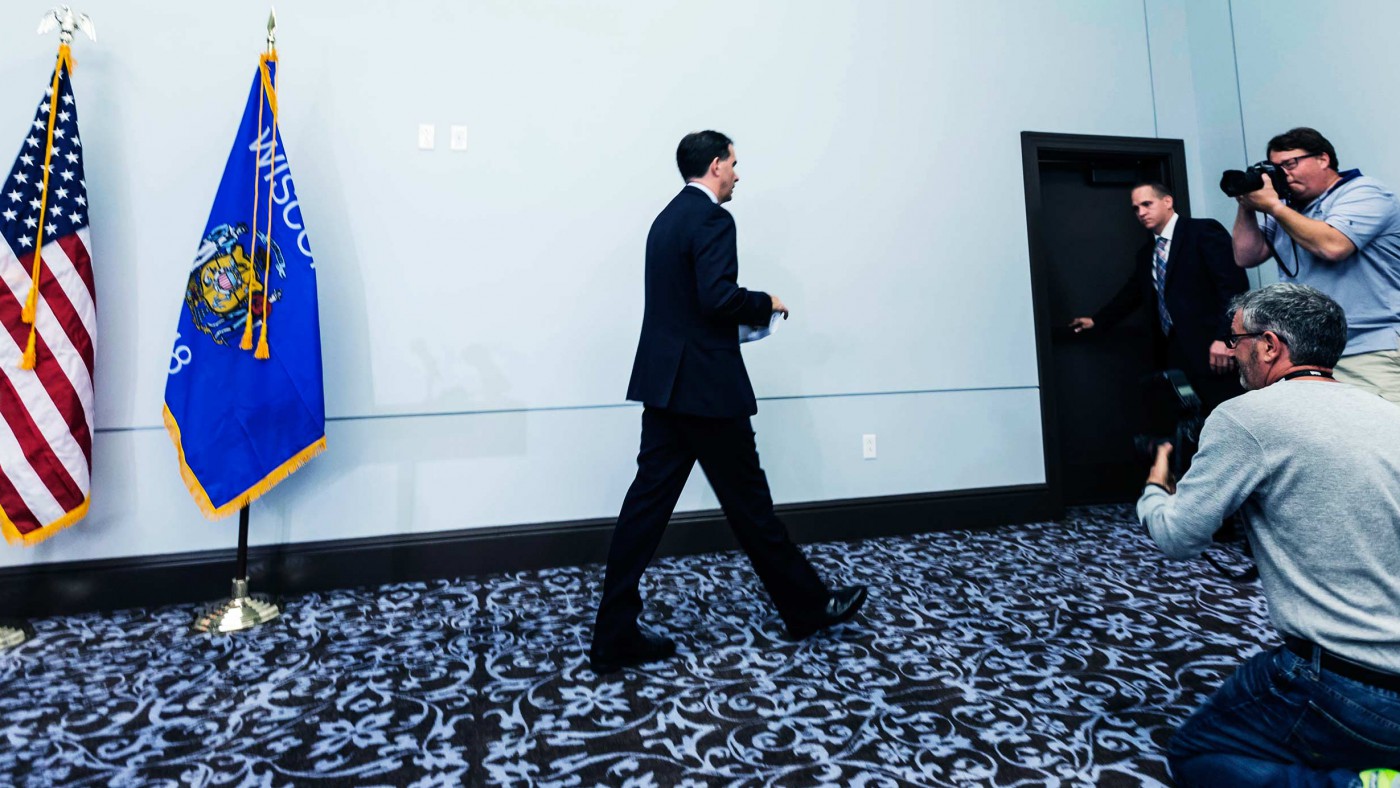The departure of Wisconsin Governor Scott Walker from the U.S. Republican presidential race on Monday will primarily benefit Senator Marco Rubio.
Even though Walker was polling practically at nought, he will no longer be a threat to Rubio when support wanes for other Republican candidates, as it undoubtedly will. Already a powerful politician in an important state—former New Hampshire state party vice-chairman Cliff Hurst—announced that he would switch his support to Senator Rubio and become co-chair of his New Hampshire campaign.
Business mogul Donald Trump, former Hewlett Packard CEO Carly Fiorina, and neurosurgeon Ben Carson are now leading in the polls, with Rubio in fourth place. The latest CNN poll, taken between 17 and 19 September, shows that 24% of Republicans support Trump; 15 percent support Fiorina; 14% support Carson; and 11% support Rubio. After Rubio comes former Florida Governor Jeb Bush, flush with funding but at only 9% in the poll.
The success of Trump, Fiorina, and Carson is due more to Americans’ distaste of traditional politicians than to the candidates’ fitness for the presidency. Other than generals, such as Dwight Eisenhower, no American has been elected president without having first held elected office. The experience of running for office at a lower level shows that candidates can survive early mistakes prepares them for the presidential campaign. Only the tough survive rounds of opposition research from the Democrats.
The three front-runners are already making mistakes. Trump is falling in the polls as people see him for what he is—a misogynist who calls women “fat pigs, dogs, slobs and disgusting animals,” who tweets that beautiful blonde Fox anchor Megyn Kelly is “a mean and bitter woman,” and who says that no one would vote for a face like Fiorina’s. Trump has no compunction about blatantly lying, as when he stated during the debate that he did not push for casinos in Florida. Tip to Trump: Don’t lie when it’s checkable.
Carson got into trouble on Monday when he said that a Muslim should never be president. During last week’s debate, he suggested that childhood vaccines be phased in over a longer period of time, even though the well-respected American Academy of Pediatrics recommends the opposite. Fiorina will have trouble defending her record as HP’s CEO, a position from which she was sacked after company’s stock fell. Many argue that HP’s purchase of Compaq during Fiorina’s tenure was a disaster.
America has flirted with non-politicians before. Businessman Ross Perot ran for president in 1992 and 1996 as a third-party candidate, ensuring a win by Democrat Bill Clinton. During the 2012 campaign, Herman Cain, chairman and CEO of Godfather’s Pizza, briefly garnered substantial support before he had to step aside due to allegations of sexual misconduct. If Cain had run for representative or senator before taking a stab at the presidency, the allegations would have surfaced earlier.
When Americans tire of Trump, Fiorina, and Carson, as they are likely to do in the next few months, Walker will no longer be a threat to Rubio and Rubio will have a clearer field. For Rubio, the departure of Walker is especially important because Walker and Rubio have a similar appeal. Both attract conservative Republicans who want a safe candidate, who are dubious of Governor Jeb Bush and Ohio Governor John Kasich for being overly moderate, and who believe that Texas Senator Ted Cruz is too extreme and Kentucky Senator Rand Paul is too libertarian.
The expected establishment front-runner, Jeb Bush, who has raised the most money, is running fifth in the polls, behind the younger Rubio. Americans admire self-made people, and are not enthusiastic about inherited power and wealth. Although Bush can boast an excellent record as Florida governor, his last name is a disadvantage. People do not have good memories of his brother, George W. Bush, and his father, George H.W. Bush, partly because of their unfair demonization by the press. That is why Jeb, as he likes to be known, is losing rather than gaining ground.
Rubio ran for the U.S. Senate in Florida in 2010 and pushed the better-funded, more-experienced favorite, Governor Charlie Crist, out of the Republican primary. Crist then ran as an Independent. At the start of the race, practically everyone predicted that Crist would beat Rubio. Now, Rubio is a leading presidential candidate and Crist is a private citizen. Rubio has become one of the primary Republican authorities on domestic and international politics, responding to the State of the Union, introducing the nominee at the Republican National Convention, and appearing on the cover of Time magazine as the savior of the Republican Party.
Many criticisms of Republicans as the party of the 1% fall flat when used against Rubio. Republicans cannot be accused of hating minorities when their pro-immigration candidate gives speeches in Spanish. Republicans cannot be said to favor the wealthy when their candidate is the son of Cuban immigrants, his father a bartender and his mother a maid. Republicans cannot be the party of “no,” and only aim to obstruct the liberal agenda of progress, when their candidate has developed and presented a thoughtful policy agenda.
Rubio has correctly identified upward mobility as Americans’ foremost political issue, and has come out with a robust portfolio of solutions. These include a new simplified tax reform plan; an education proposal that encourages private investors to fund college tuition in exchange for a share of a student’s future income; and reform of government health programs and pensions. Rubio has the perfect populist pitch to neutralize the Democrats’ advantage on advocacy for the lower and middle classes and stand against the old guard of former Secretary of State Hillary Clinton, Vermont Senator Bernie Sanders, or Vice President Joe Biden.
With Walker’s departure, the path to the presidency becomes a little easier for Marco Rubio. Only time will tell if he will achieve his goal.


